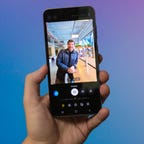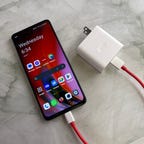Prepaid phone carriers are constantly touting deals and promotions on cellphone plans. Most prepaid phone operators are owned by or closely affiliated with AT&T, T-Mobile or Verizon. This means that the best phones that work on postpaid plans generally also work on prepaid plans. For instance, T-Mobile is the owner of Mint Mobile, AT&T owns Cricket and Visible is owned by Verizon Wireless. Other prepaid phone carriers like Boost Mobile and Google Fi give you access to those same networks along with competitive pricing and perks. This allows for a lot of flexibility when you sign up for a prepaid plan because nearly any unlocked phone can be brought over.
Most prepaid phone carriers also sell devices, and while their promotions aren’t necessarily anywhere close to a “free iPhone,” you can still get smaller discounts when switching to a prepaid phone carrier. For this list, we took into account phones that are available directly from prepaid carriers, alongside value-filled phones you can buy unlocked.
Read more: Best Prepaid Phone Plans
What is the best prepaid phone of 2024?
Like with any phone choice, the best device is going to depend on what you value the most from your phone as a communication device and as a camera. If device cost is the most sensitive issue alongside getting a cheaper prepaid phone plan, then the $200 Samsung Galaxy A15 5G is the option I can most recommend.
Prepaid phone carriers sometimes offer even cheaper options than the Galaxy A15, this Samsung phone is the lowest-cost way to get a device that includes 5G compatibility and NFC for contactless payments. Samsung provides the A15 with four major software updates along with five years of security updates, making it a secure phone to use for several years. The device is a little sluggish in performance and the camera isn’t great, but if cost is the highest priority then the A15 is otherwise a great entry-level option for a prepaid phone plan.
Best prepaid phones of 2024
Samsung’s $200 Galaxy A15 5G is an easy choice for someone looking to buy a phone that will last for years. Samsung provides it with four years of software updates and five years of security support, which in this price range is unparalleled. Plus the phone supports 25-watt wired charging that in my testing was able to charge half of its big 5,000-mAh battery from empty in 30 minutes. I also like the eye-catching light blue option.
A $200 phone has to have some compromises. The Galaxy A15 5G feels sluggish compared to competing phones like Motorola’s $200 Moto G 5G and as an entertainment machine falls short with its single audio speaker that is blocked by accident when you hold the phone sideways for games and video. Photography, which is typically a weak point on phones in this price range, is similarly mixed with decent photography in outdoor environments while struggling to photograph lowlight spaces. This makes the Galaxy A15 5G an easy choice for when you just need a phone that can handle the basics, but you may want to consider other options if you are looking for the best pocket YouTube player in this price range.
The Pixel 8A is so good it makes the regular Pixel 8 almost feel irrelevant. It shares so much in common with its pricier sibling, from its selection of AI-powered features like Circle to Search to its cool aesthetic and powerful Tensor G3 processor, that it’s hard to see why anyone would buy the Pixel 8 instead.
The Pixel 8 does offer a marginally better camera system, a slightly larger screen and the ability to charge other phones and accessories wirelessly on the back of the device. Those features don’t feel significant enough to impact the buying decision for most people. As I wrote in my review, the Pixel 8A raises the bar for what a $500 phone should be. That also means I’ll be expecting more from the Pixel 9 this fall.
What impresses me the most about the Samsung Galaxy S24 isn’t the new Galaxy AI features, brighter screens or solid cameras. It’s the battery life. After testing, I can say the larger battery in the Galaxy S24 has no trouble plowing through a long day of use on a single charge.
The S24 is a wonderful, well-built phone that is excellent right out of the box just as the nearly identical S22 and S23 were before it. This similarity to the S22 and S23 can be viewed as either a strength because the design reflects three years of refinements, or a weakness because features like the camera hardware are essentially identical to what came out in 2022. All of this is overshadowed by the great battery life. You’ll never hear anyone complain about getting too much battery life. Read our Samsung Galaxy S24 review.
The iPhone 16 is anything buy cheap, but it’s also not Apple’s most expensive phone. With its handy new photography features, convenient Action button and elegant build, the iPhone 16 and 16 Plus are top-notch choices for Apple fans in search of a new phone. The iPhone 16’s key feature, Apple Intelligence, isn’t available yet, but the fact that these phones will support it means they’ll likely feel future-proofed for years to come. For those who don’t need the Pro’s extra photography prowess and battery life, the iPhone 16 won’t disappoint. Aside from screen size (6,1 inches on the regular, 6.7 inches on the Plus), battery size and price, the iPhone 16 and 16 Plus are identical in every way.
The iPhone 16 isn’t perfect — it’s missing an always-on display, and it feels like it’s been ages since Apple improved its wired charging speeds. It checks all the important boxes, and then some.
The $300 OnePlus Nord N30 5G includes a lot of features for the money, but its 50-watt charging speed is a standout for this price range. The phone can charge from 0% to 100% in 45 minutes, and most other phones that cost $300 or less need 90 minutes to two hours to do the same thing. The large 6.72-inch 1080p display runs at a 120Hz refresh rate and also makes apps, games, websites and streaming video animate smoothly.
It’s worth calling out that the 108-megapixel main camera — despite being an astounding megapixel number on a phone — takes photos that are only marginally better than what I usually see from phones in this price range. That means it can take good, detail-filled photos in outdoor settings with plenty of light. Photos taken in darker settings are a struggle for the N30, with indoor photos looking washed out or blurry.
The phone will also only get one software update to Android 14 (released in late 2023) along with three years of security updates — which is an average timeline for this price range yet still disappointingly short.
At $599, the iPhone 14 is a great buy and solid upgrade, especially if you’re using an 11 or older. There are two models the 6.1-inch iPhone 14 and the 6.7-inch iPhone 14 Plus that normally starts at $699. Both phones are identical and really the deciding factor comes down to screen and battery size as well as price. The iPhone 14 and 14 Plus have a long battery life, fast performance, great durability and wonderful cameras as well as safety features like Crash Detection and Emergency SOS via Satellite.
Both phones came out in September 2022 originally but are still solid options today. In terms of drawbacks, neither phone has a high refresh rate screen, and always-on display or the newer Action button found on the 15 Pro and iPhone 16 series. But at hundreds of dollars less, we think that the iPhone 14 and 14 Plus have the best value for the dollar that Apple currently sells.
There’s a lot to like about the Pixel 9, from its respectable camera to its classy new design and lengthy 7-year timeline for software updates. Google’s phones have always shined for their clean, slick software, and that once again applies to the Pixel 9 series. Pixels are also among the first to get new software updates, making them an ideal choice for those who want to get their hands on the latest version of Android first. Aside from Android updates, Google also brings new features to Pixel phones throughout the year through updates it calls Feature Drops.
The Pixel 9 comes with a few new AI tricks that you may find useful, like the ability to search for content in screenshots, generate images from scratch in the Pixel Studio app and add new objects in photos. These features aren’t must-haves, and they’re not without flaws. Plus, at a starting price of $799, the Pixel 9 has a higher bar to live up to. The Pixel 9 feels like it belongs in that class of device.
Editor’s note: Google released the Pixel 8A, also $500. You can read our Pixel 8A review here. If you’re buying a Pixel 7A make sure it’s on sale.
Google’s budget phone took a leap forward in 2023 with the Pixel 7A, which offers many of the same benefits as the Pixel 7 but at a cheaper price. Like the Pixel 7, the Pixel 7A runs on Google’s Tensor G2 processor, meaning it has many of the same photo editing and language translation features as its pricier sibling. The Pixel 7A’s 64-megapixel camera also takes excellent photos that rival the Pixel 7’s in quality.
We still like the Pixel 7, but the Pixel 7A’s lower price makes it a better deal for most people. Otherwise, the main differences between the Pixel 7 and 7A come down to the former’s more durable build, slightly faster charging and its ability to wirelessly charge compatible accessories. The Pixel 7 also has a larger camera sensor that’s more sensitive to light, according to Google, but CNET’s Lisa Eadicicco didn’t notice much of a difference.
Finding the right price is key: A benefit to getting a prepaid phone plan over postpaid is that by buying your service upfront, you won’t otherwise be stuck on a contract nor do you need to get a credit check to sign up for a cellphone plan. It does mean that you are unlikely to receive a deep discount on your next device when you aren’t bringing over an existing one since many phone carriers offer hefty device subsidy incentives when signing up with a new postpaid plan or renewing an existing one. This means that device cost is going to be a very important issue when buying a phone to use on a prepaid plan because you could be footing the entire bill.
Target your most important needs: You’ll want to decide whether you need a cheaper device that covers all of your essential functions or if you are OK with springing for a more expensive device with more capabilities.
Remember to shop around: Many U.S. phone purchases are made through a phone carrier, but most prepaid phone plans include a bring-your-own-device option. This means you don’t have to buy your handset from a prepaid phone carrier to sign up with them, which is helpful if you have one already or especially if you find a deal at another store for the same device. After purchase, you will instead sign up for a plan with your prepaid carrier and follow their directions for setting up your device with their service.
Make sure you buy a compatible device: Even though you don’t have to buy your phone from a prepaid carrier, you do need to make sure the phone you purchase is compatible with it. For instance, if you are buying a phone to use on Mint Mobile, you’ll want to make sure that it’s a device that’s compatible with T-Mobile’s network. Same with Cricket, running on AT&T. Same with Visible, running on Verizon. Most prepaid carriers will tell you what networks their service runs on, and that will help you match up what device you need from there.
Every phone on this list has been thoroughly tested by CNET’s expert reviews team. We use the phone, test the features, play games and take photos. We assess any marketing promises that a company makes about its phones. If we find something we don’t like, be it battery life or build quality, we tell you about it.
We examine every aspect of a phone during testing:
- Display
- Design and feel
- Processor performance
- Battery life
- Camera quality
- Features
We test all the phone’s cameras (both front and back) in a variety of conditions: from outdoors under sunlight to dimmer indoor locales and nighttime scenes (for any available night modes). We also compare our findings against similarly priced models. We have a series of real-world battery tests to see how long a phone lasts under everyday use.
We take into account additional phone features like 5G, fingerprint and face readers, styluses, fast charging, foldable displays and other useful extras. We weigh all our experiences and testing against the price so you know whether a phone represents good value.
Read more: How we test phones
Should you buy a cheaper new phone or an older phone?
Prepaid phone carriers sell a wide variety of phones — including many flagship phones from yesteryear — for our best prepaid phones list, I’ve focused the picks on phones that are currently available unlocked from a phone maker in addition to phones you can buy directly from a carrier. This is partly because of software and security updates — each of these picks will receive at least one major software update and at least three years of security updates, which extend the lifespan of these phones.
It’s an important distinction, because even though you can buy a device like the Samsung Galaxy A03S from Mint Mobile for $99, that device is no longer receiving security updates. This means the phone is no longer as safe to use as a lower-cost device that is still receiving active vulnerability protection from its phone maker.
As a result, most picks on this list are phones that have been released within 2023-24, with the exception of Apple’s iPhone 14. This is because Apple’s phones historically receive many years of software and security support — for instance while Apple recently sunset major iOS software updates to 2017’s iPhone X and iPhone 8, both devices are still receiving security updates. This allows us to be quite confident that Apple will be providing many more years of software and security updates to the iPhone 14, even as the device enters its third year on the market.
Watch this: Best Budget Phone Plans in 2022 (and the Fine Print)
 synnbiob
synnbiob





